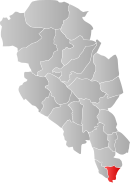Lunner
| Lunner kommune | |||
|---|---|---|---|
| Municipality | |||
 |
|||
|
|||
 Lunner within Oppland |
|||
| Coordinates: 60°15′10″N 10°40′2″E / 60.25278°N 10.66722°ECoordinates: 60°15′10″N 10°40′2″E / 60.25278°N 10.66722°E | |||
| Country | Norway | ||
| County | Oppland | ||
| District | Hadeland | ||
| Administrative centre | Roa | ||
| Government | |||
| • Mayor (2015) | Harald Tyrdal | ||
| Area | |||
| • Total | 292 km2 (113 sq mi) | ||
| • Land | 272 km2 (105 sq mi) | ||
| Area rank | 281 in Norway | ||
| Population (2015) | |||
| • Total | 9,003 | ||
| • Rank | 121 in Norway | ||
| • Density | 31/km2 (80/sq mi) | ||
| • Change (10 years) | 4.6 % | ||
| Demonym(s) | Lynnersokning Lynbying Lunbying |
||
| Time zone | CET (UTC+1) | ||
| • Summer (DST) | CEST (UTC+2) | ||
| ISO 3166 code | NO-0533 | ||
| Official language form | Bokmål | ||
| Website | www |
||
|
|
|||
Lunner is a municipality in Oppland county, Norway. It is part of the traditional region of Hadeland. The administrative centre of the municipality is the village of Roa. Lunner was established when it was separated from the municipality of Jevnaker on 1 January 1898.
The municipality (originally the parish) is named after the old Lunner farm (Old Norse: Lunnar), since the first church was built here. The name is the plural form of lunnr which means "to have a meal between the conventional lunch and dinner times" "log". (The farm and the church are located on a long hill which was probably compared to a log.)
The coat-of-arms is from modern times. They were granted on 4 April 1986. The arms show a Lily of the Valley, as a symbol for the forests in the area. The Lily of the Valley is a very common flower in the meadows and forests. The flowers also symbolize the eight schools in the municipality.
Lunner is bordered to the north by the municipality of Gran, to the east by Nannestad, to the south by Nittedal and Oslo, and to the west by Jevnaker. There are several population centers in the municipality. Amongst these are: Harestua, Grua, Roa, and the village of Lunner.
Lunner is 23 kilometres (14 mi) on a north–south axis (23.1 km with water included) and 16.2 kilometres (10.1 mi) on an east–west axis. It lies at the southern end of Oppland county. The highest point is the Bislingflaka with a height of 691 metres (2,267 ft). Lakes in the region include Avalsjøen.
...
Wikipedia


